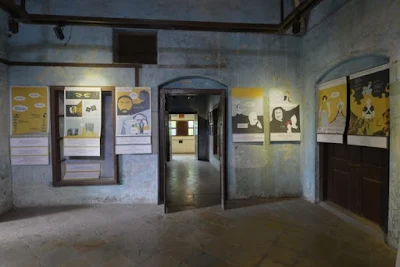 |
| Museum of Conflicts, Ahmedabad |
Ahmedabad-based museum of conflicts, Conflictorium, situated in the heart of the walled city which is the latest recipient of Unesco’s prestigious World Heritage tag, has been awarded the Curry Stone Design Prize, an yearly award in honor innovative projects that use design to address pressing social justice issues.
Supported by the Curry Stone Foundation, the prize rewards projects that improve daily living conditions of people in communities around the world. According to a Foundation source, the winning projects emerge from a wide pool of nominations, which are selected by a rotating team of approximately 200 contemporary design leaders from across the world.
“Selection is via a jury process, with the jury composed of Foundation members and invited international experts”, the Foundation, which is a registered US non- profit corporation in the state of Oregon, adds.
One of the 100 “most compelling” social design practices across the globe, commenting on the award to the Coflictorium, the Foundation says, it is “a new kind of museum and interactive cultural centre dedicated to exploring and reconciling the conflicts of South Asia.”
It adds, “The centre aspires to integrate art, law, history, culture and behavioural sciences to offer lessons and promote dialogue about the nature of conflict and the evergreen possibility of resolution and reconciliation.”
The Foundation underlines, “Most museums and memorials across the world focus on a particular conflict, or on the particular dimensions a conflict. They memorialize a battle, a war, a genocide, or a victory.”
Against this backdrop, it adds, the Foundation decided to “honour Conflictorium, because it aspires to transcend this limited framework and speak more holistically about how conflicts begin and how they can be resolved.”
Noting that Conflictorium was “designed with a series of thoughtful, universal exhibits”, the Foundation gives the example of the Gallery of Disputes in the museum, “which aims to bring forth various kinds of conflicts and their causes in the context of our social fabric.”
It adds, “The Gallery of Disputes illustrates these conflicts and their causes through storytelling, using animal characters and other devices to ensure that the narratives remain universally accessible.”
Pointing towards other exhibits in the Conflictorium such as the Empathy Alley, the Moral Compass, the Memory Lab, and the Sorry Tree, the Foundation says, “All exhibits focus continuously on unpacking conflict as an idea, and understanding the universal themes of intolerance which undergird all conflicts the world over.”
Other recipients of the award under the motto, “What can design do to promote peace?”, are Decolonizing Architecture Art Residency, Beit Sahour, Palestine; Hester Street, New York, USA; the Foundation for Achieving Seamless Territory, Amsterdam; Museo dell’Altro e dell’Altrove di Metropoliz, Rome; Bait al Karama (House of Dignity), Nablus, Palestine; Turquoise Mountain, Edinburgh, UK; and the Refugee Academy, Berlin.
Designed by Ahmedabad-based culture activist Avni Sethi, Conflictorium was founded on April 14, 2013 by a group of voluntary organizations, Centre for Social Justice, Janvikas and Navsarjan Trust, in the Gool Lodge, Mirzapur, Ahmedabad.
Conflictorium is inspired by top Turkish Nobel laureate novelist Orhan Pamuk, 65, who founded Museum of Innocence in Istanbul in 2012, where a collection evocative of everyday life and culture of Istanbul. His second novel after receiving the Nobel Prize in 2006 is called “Masumiyet Müzesi” (The Museum of Innocence), which came out in 2008.
It adds, “The centre aspires to integrate art, law, history, culture and behavioural sciences to offer lessons and promote dialogue about the nature of conflict and the evergreen possibility of resolution and reconciliation.”
The Foundation underlines, “Most museums and memorials across the world focus on a particular conflict, or on the particular dimensions a conflict. They memorialize a battle, a war, a genocide, or a victory.”
Against this backdrop, it adds, the Foundation decided to “honour Conflictorium, because it aspires to transcend this limited framework and speak more holistically about how conflicts begin and how they can be resolved.”
Noting that Conflictorium was “designed with a series of thoughtful, universal exhibits”, the Foundation gives the example of the Gallery of Disputes in the museum, “which aims to bring forth various kinds of conflicts and their causes in the context of our social fabric.”
It adds, “The Gallery of Disputes illustrates these conflicts and their causes through storytelling, using animal characters and other devices to ensure that the narratives remain universally accessible.”
Pointing towards other exhibits in the Conflictorium such as the Empathy Alley, the Moral Compass, the Memory Lab, and the Sorry Tree, the Foundation says, “All exhibits focus continuously on unpacking conflict as an idea, and understanding the universal themes of intolerance which undergird all conflicts the world over.”
Other recipients of the award under the motto, “What can design do to promote peace?”, are Decolonizing Architecture Art Residency, Beit Sahour, Palestine; Hester Street, New York, USA; the Foundation for Achieving Seamless Territory, Amsterdam; Museo dell’Altro e dell’Altrove di Metropoliz, Rome; Bait al Karama (House of Dignity), Nablus, Palestine; Turquoise Mountain, Edinburgh, UK; and the Refugee Academy, Berlin.
Designed by Ahmedabad-based culture activist Avni Sethi, Conflictorium was founded on April 14, 2013 by a group of voluntary organizations, Centre for Social Justice, Janvikas and Navsarjan Trust, in the Gool Lodge, Mirzapur, Ahmedabad.
Conflictorium is inspired by top Turkish Nobel laureate novelist Orhan Pamuk, 65, who founded Museum of Innocence in Istanbul in 2012, where a collection evocative of everyday life and culture of Istanbul. His second novel after receiving the Nobel Prize in 2006 is called “Masumiyet Müzesi” (The Museum of Innocence), which came out in 2008.





Comments